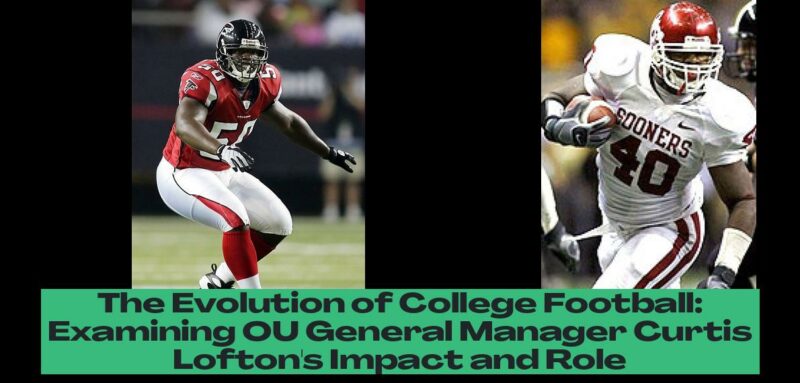How OU General Manager Curtis Lofton’s Role Shows the Evolution of College Football
The world of college football is constantly evolving, and the recent hiring of Curtis Lofton as the University of Oklahoma’s first-ever general manager is a prime example of this ongoing transformation. This move reflects the increasing complexity and competitiveness of the sport, demanding a more strategic and comprehensive approach to building successful programs.
Curtis Lofton, a former All-America linebacker for the Sooners, brings a wealth of experience and knowledge to this new role. He has already been a key figure in OU’s recruiting efforts, serving as the director of the Sooners’ S.O.U.L. Mission. Now, as general manager, he will oversee and manage the entire recruiting operation, working in tandem with head coach Brent Venables.
Lofton’s role is not just about finding the best talent; it’s about building a winning culture and fostering a strong team dynamic. He will be responsible for identifying players with the right mix of athletic ability, character, and academic potential. This means delving deep into the world of high school recruiting and navigating the ever-changing landscape of the transfer portal.
The creation of this general manager position underscores the growing importance of recruiting in college football. It’s no longer just about talent evaluation; it’s about building relationships, leveraging data, and strategically navigating the complex world of college athletics. Lofton’s position represents a shift towards a more professional and structured approach to recruiting, mirroring the evolution of the sport itself.
The hiring of Lofton is a bold move by Oklahoma, signaling their commitment to staying ahead of the curve in the ever-changing landscape of college football. This strategic move is likely to be a blueprint for other programs looking to enhance their recruiting operations.
- The hiring of Curtis Lofton as OU’s first general manager showcases the evolving landscape of college football, emphasizing the need for a more strategic and comprehensive approach to recruiting and program building.
- Lofton’s role extends beyond talent evaluation to include fostering a winning culture, identifying players with the right mix of skills, character, and academic potential, and navigating the complexities of high school recruiting and the transfer portal.
- The creation of the general manager position at OU highlights the increasing importance of recruiting in college football, emphasizing relationship-building, data utilization, and strategic decision-making in player acquisition.
- Lofton’s appointment signifies Oklahoma’s commitment to innovation and staying ahead in the competitive world of college athletics, setting a potential standard for other programs seeking to enhance their recruiting operations.
- Venables’ recognition of the need for a dedicated individual like Lofton to lead recruiting efforts reflects a shift towards a more professional and structured approach in building championship programs, aligning with the evolving nature of college football.
A Deeper Dive into Lofton’s Role and its Significance
Lofton’s role as general manager goes far beyond simply finding talented players. It encompasses a multifaceted approach to building a championship program. Venables, known for his meticulous attention to detail and strategic thinking, understands the need for a dedicated individual to spearhead the recruiting process, leaving him free to focus on coaching and game strategy.
Lofton’s responsibilities will include everything from identifying potential recruits to managing relationships with high school coaches and families. He will also be tasked with navigating the complex world of the transfer portal, a recent phenomenon that has significantly altered the landscape of college football. This involves evaluating players from various backgrounds, assessing their fit within the team’s culture, and ensuring they are prepared for the academic and athletic demands of OU.
Beyond technical skills, Lofton’s success will depend on his ability to build strong relationships with both players and coaches. This requires understanding the nuances of recruiting, navigating the emotional aspects of the process, and fostering a culture of trust and transparency. He must be able to connect with young athletes, understand their aspirations, and help them make informed decisions about their future.
Lofton’s role, therefore, is a testament to the evolution of college football, where recruiting has become a strategic process demanding a dedicated and experienced professional. He represents a new breed of college athletic administrators, one that understands the importance of data, relationship building, and navigating the complex world of college sports.
Impact of Lofton’s Role on the Future of College Football
The creation of the general manager role at Oklahoma is a significant step forward in the evolution of college football, setting a precedent for other programs. It represents a shift towards a more professional and structured approach to recruiting, mirroring the growing complexity and competitiveness of the sport.
As college football continues to evolve, we can expect to see more programs adopting similar strategies, creating dedicated positions to oversee recruiting operations. This will lead to an even more competitive landscape, with programs constantly seeking ways to gain an advantage in securing top talent.
Lofton’s role is also a testament to the growing importance of data analysis and technology in college football. Recruiting is no longer simply about scouting talent; it’s about leveraging data to identify potential stars, predict future performance, and make informed decisions. This trend is likely to continue, with programs investing in advanced analytics and sophisticated scouting tools.
The impact of Lofton’s role extends beyond Oklahoma. It signals a broader trend in college football, where programs are increasingly looking for dedicated professional expertise to manage the complexities of recruiting. This shift will likely lead to a more professionalized landscape, with programs investing in specialized roles and resources to ensure their recruiting operations are competitive and effective.
Conclusion: The Future of College Football
Curtis Lofton’s appointment as OU’s general manager is a clear sign of the evolution of college football. The sport is becoming increasingly complex, demanding a more strategic and professional approach to building successful programs. Lofton’s role represents a turning point, highlighting the growing importance of recruiting and the need for dedicated expertise to navigate this complex world.
As college football continues to evolve, we can expect to see more programs adopt similar strategies, creating dedicated positions to oversee recruiting operations. This will lead to an even more competitive landscape, where programs constantly seek ways to gain an advantage in securing top talent. The future of college football will be shaped by those who embrace innovation, leverage technology, and invest in building a strong foundation for success.
Lofton’s appointment is a testament to the evolving nature of college football, where the pursuit of excellence demands a multifaceted approach. As the sport continues to evolve, we can expect to see more programs adopt similar strategies, creating a new era of recruiting and competition.









